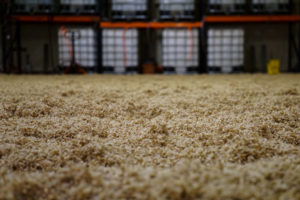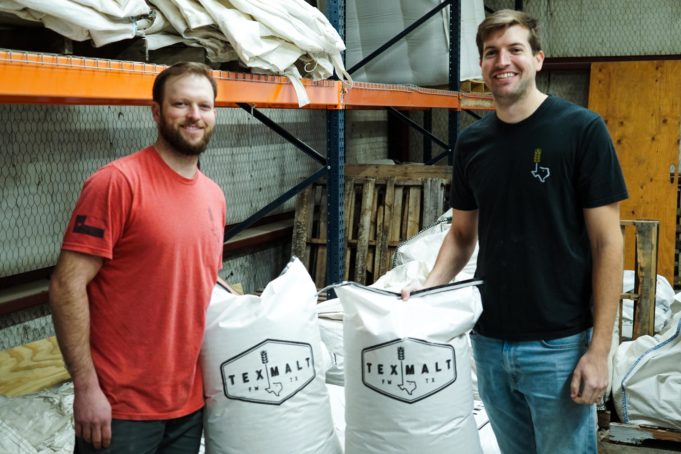Fort Worth’s breweries pride themselves on being hyperlocal, and they largely achieve that aim by hiring locally, donating beer to charity events, and revitalizing the neighborhoods they cohabit. Local breweries are so invested in supporting local, in fact, that Chase Leftwich and Austin Schumacher were surprised to find that the malted barley that produces much of our beer comes from as far away as Canada and Europe.
Four years ago, they founded TexMalt, a Fort Worth-based malting company that sources Texas grains that are malted in-house using traditional techniques. The malted barley and other grains are then sent to craft breweries and distilleries. The duo recently gave me a tour of their facility in the renovated O.B. Macaroni Company near downtown.
There are basically three steps involved in malting, they told me. The process begins in the back of the facility. Step one involves waking the seeds up, which starts with steeping the grain in water. After around 48 hours, the seeds (barley the day I visited) are spread out on a large back room floor that maintains a temperature of 55 to 60 degrees.
Every several hours, Leftwich and Schumacher rake and flip the germinating grains to allow them to respire without becoming tangled. This step is where the magic happens. Deep in these kernels, the seeds are beginning to break down dense starches using enzymes. That process is placed on pause (step three) when the cereal grains are toasted in a kiln. Once TexMalt malted grain reaches a brewery or distillery, the process of breaking down starches into simple sugars is completed.
“As a brewer, you want your malt to have certain specifications,” Schumacher said. “Everything from the foam to the color of the beer has to do with the quality of malt, which has to do with the quality of barley. We are the middle man.”

The first local brewery to hop on the TexMalt bandwagon was The Collective Brewing Project. The brewpub’s co-founder Ryan Deyo tasted the finished product and promised to be a steady purchaser of TexMalt grains, Leftwich said.
“That was the snowball we needed,” Leftwich recalled.
Over the past four years, TexMalt grains have been the base grain for spirits and beers at Acre Distilling, Chimera Brewing Company (now Fort Brewery & Pizza), Panther Island Brewing, Hopfusion AleWorks, and others.
Leftwich and Schumacher went into detail about how North Texas soil is ideal for embuing complex flavors within corn, barley, and other grains. The Weekly will explore that topic (terrior) in print in the coming weeks.

As more distilleries and breweries begin appreciating the benefits of using local grains, Leftwich and Schumacher are ready to consult and deliver on locally sourced products. The environmental benefits of going local are obvious. A growing number of breweries are beginning to see the merits of using local grain in terms of flavor and profile. One day, the idea of grains being harvested, germinated, dried, brewed, and consumed within a small radius won’t be so revolutionary.
Don’t forget to follow On Tap in Fort Worth’s Facebook page
On Tap this Week:
Fall Gallery Night Afterparty at Blackhouse. March 30 $25 entry fee. Drinks included. Details and performances TBA. Best time of your life. Event info here.
$25 entry fee. Drinks included. Details and performances TBA. Best time of your life. Event info here.
Martin House Brewing Company 6 Year Anniversary. March 30.













